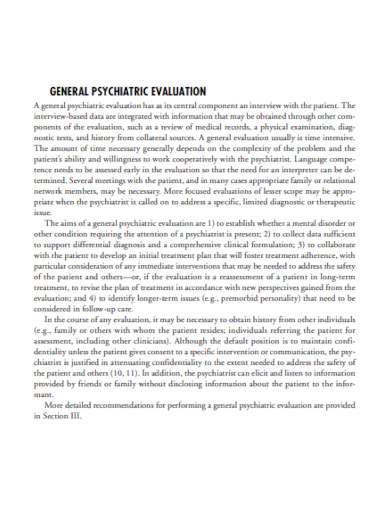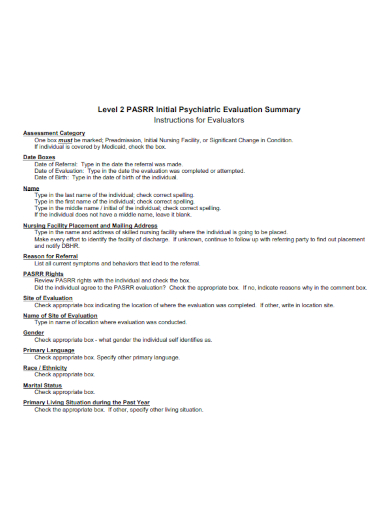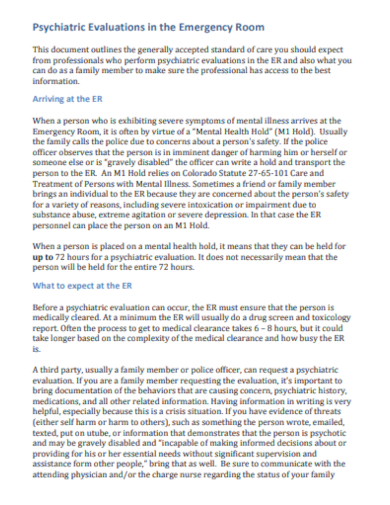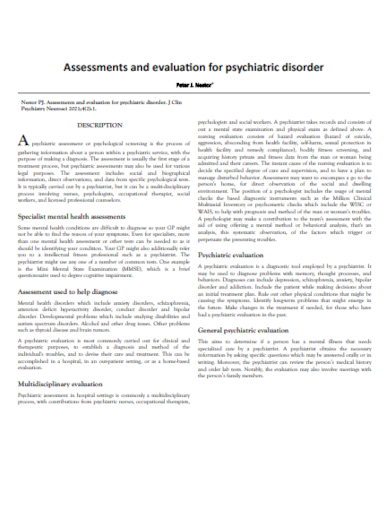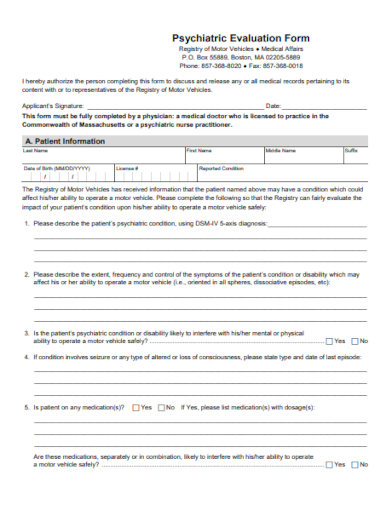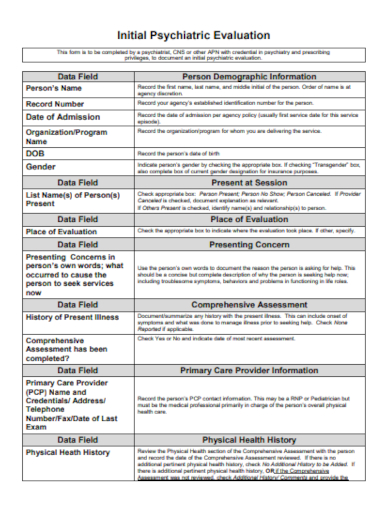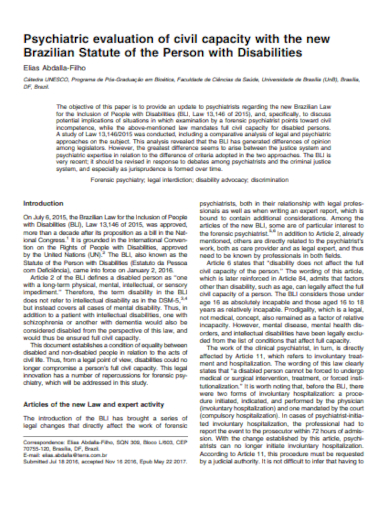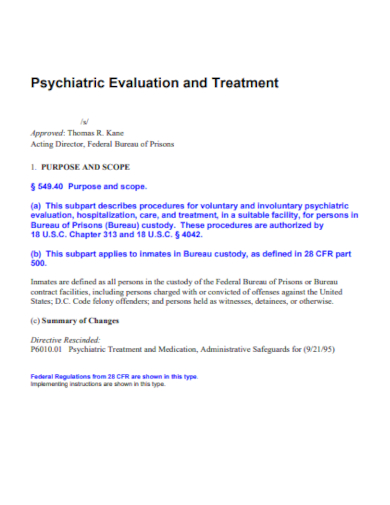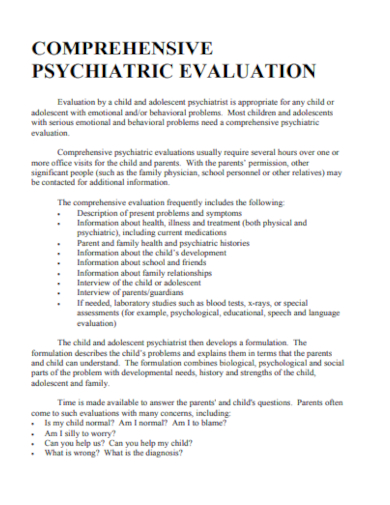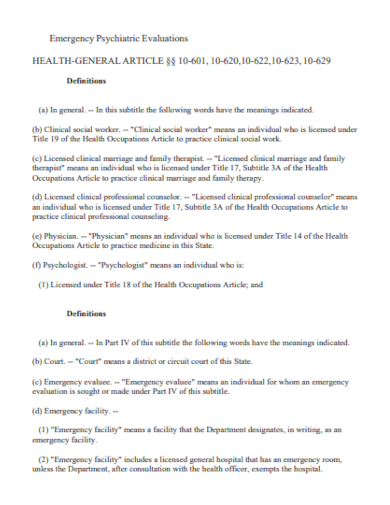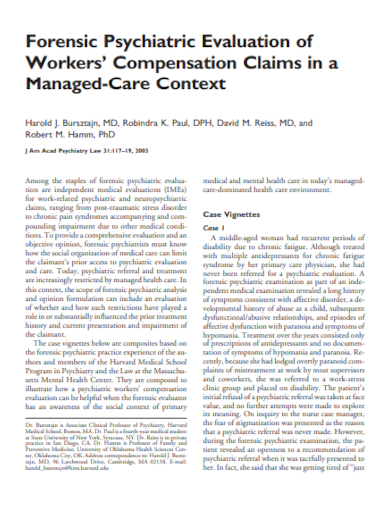To identify the disorder and help a patient get the best analysis and treatment for their current condition, psychiatrists use a psychiatric evaluation template which enables the formulation of effective psychiatric diagnoses. A psychiatric evaluation is only conducted by professional and certified psychiatrists results can include depression, schizophrenia, bipolar disorder, addiction, and anxiety. This evaluation is conducted for anyone who suspects that they are challenged by their feelings, behaviors, or environmental conditions, causing them to act uncontrollably, impulsively, or rebelliously.
FREE 10+ Psychiatric Evaluation Samples
1. General Psychiatric Evaluation
2. Initial Psychiatric Evaluation Summary
3. Emergency Room Psychiatric Evaluations
4. Assessment and Evaluation for Psychiatric Disorder
5. Psychiatric Evaluation Form
6. Initial Psychiatric Evaluation
7. Standard Psychiatric Evaluation
8. Psychiatric Evaluation Treatment
9. Comprehensive Psychiatric Evaluation
10. Health Emergency Psychiatric Evaluation
11. Worker Compensation Psychiatric Evaluation
What is a Psychiatric Evaluation Template?
A psychiatric evaluation template is an assessment form that professional psychiatrists use to conduct mental status examinations and evaluations of their clients. This template can be customized based on a patient’s needs as every patient have a different condition and needs different mental health treatment. Mental health assessments or psychological assessments can be done on any patient regardless of their age and can be based on their current behavior and its related physical, genetic, social or environmental, emotional, educational, and educational influences that result in certain behaviors.
How can I Use a Psychiatric Evaluation Template?
Psychiatric evaluation templates are used to determine the client treatment plan a patient needs and other prescriptions they’ll need based on their medical evaluations. Some of the problems a patient can encounter are issues with their relationships with other individuals, substance abuse, difficulty with emotional expression, and more.
Step 1: Compose your Guideline Statements
A guideline aims to improve and develop the quality of relationships between a doctor and their patient, ensures the accuracy of the psychiatric diagnoses, and identifies the proper treatment selection or plan.
Step 2: Provide a Description of the Patient’s Behavior and Symptoms
A psychiatric evaluation template should also include information about the patient’s behavior and symptoms. The behavior can refer to the event when it happened, how long it lasted, and the conditions in which the behaviors most often occur while the symptoms can refer to physical and psychiatric symptoms.
Step 3: Determine the Potential Benefits and Harms of the Evaluation
It is important to identify first the patient is experiencing abnormalities in their mood, thought process, perception, anxiety, and more to develop a diagnosis. You also have to determine the pattern and presence of other conditions which is considered for the potential benefits and harms of the treatment plan.
Step 4: Use Effective Methods in Performing Assessments
A psychiatric evaluation is typically conducted by interviewing the patient but this approach depends on various factors such as the patient’s ability to speak or communicate, cooperation, illness severity, and the ability to remember details.
FAQs
What is the difference between a psychiatrist and a mental health counselor?
A psychiatrist is a medical doctor who specializes in diagnosing and treating mental illnesses like depression and anxiety as well as can prescribe personal medication lists to treat these disorders. While a mental health counselor assesses and treats mental and emotional health disorders by helping patients develop relevant changes in their behavior.
What mental disorders can psychiatrists diagnose and treat?
A psychiatrist has the ability to diagnose and treat mental disorders like anxiety disorders, mood disorders like depression and bipolar, personality disorders, eating disorders, PTSD, and more.
How does a professional perform a psychiatric evaluation?
Professional psychiatrists perform their evaluations through interviews with the patient, interviews with the patient’s family members, physical examinations, and medical examinations. The psychiatrist also has to ensure that the patient has signed a Consent to Treat form to make sure that they are agreeing to the treatment they are receiving.
A psychiatric evaluation template is used by professional psychiatrists when assessing or diagnosing patients. This will enable them to determine which mental disorder the patient is suffering from and prescribe them the proper health medications. An evaluation might take between 60-90 minutes depending on the person they are evaluating or interviewing.
Related Posts
FREE 35+ Risk Assessment Form Samples
FREE 11+ Sample Self-Assessment
FREE 10+ Patient Progress Note Samples
FREE 10+ Sample Psychological Reports
FREE 10+ Consultant Assessment Samples
FREE 9+ Health Assessment Samples
FREE 9+ Sample Lecture Evaluation Forms
FREE 8+ Mental Health Counselor Job Description Samples
FREE 5+ Sample Medical Evaluation
FREE 3+ Intake Progress Note Samples
FREE 19+ Sample Assessment
FREE 10+ Change Impact Statement Samples
FREE 10+ Nursing Research Proposal Samples
FREE 9+ Client Treatment Plan Samples
FREE 9+ Consent to Treat Form Samples

